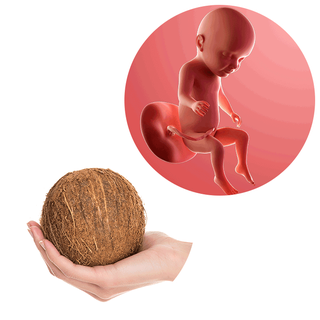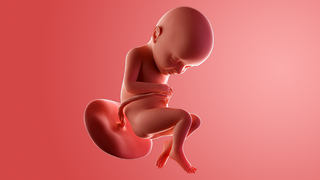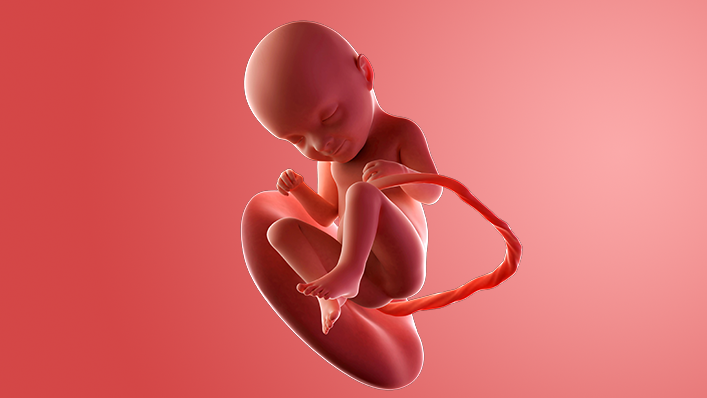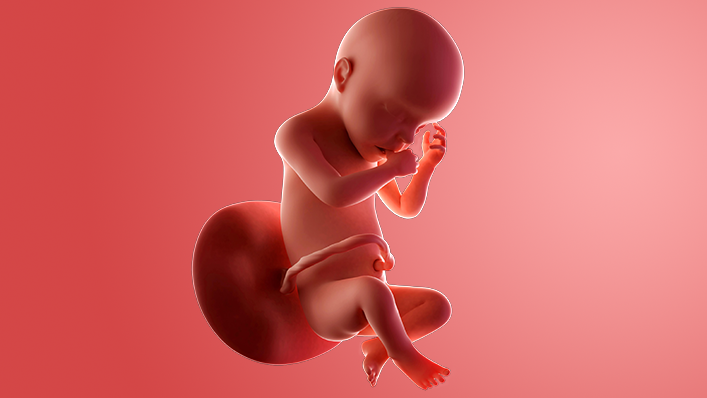- Week 28
- Week 29
- Week 30
- Week 31
- Week 32
- Week 33
- Week 34
- Week 35
- Week 36
- Week 37
- Week 38
- Week 39
- Week 40
- Week 41
Week 31
This might be hard to believe, but you are almost there!
You're very unlikely to go beyond another 9 or 10 weeks. You could have your baby in just 6 weeks, which would not be considered early.
What's happening in my body?
Your baby and bump are still growing.
In a couple of weeks, you will both go through a final growth spurt. Your baby still has lots of fattening up to do before the big day arrives.
If this is your first baby, then your midwife or doctor will probably check the size of your uterus (womb). This can be estimated by measuring up your stomach, from the top of your pubic bone to the top of your bump.
They will also gently feel your belly to work out which way up your baby is positioned. Some babies will be head down, ready for birth.
You may have felt your baby move into place and seen your bump shift downwards.
If your baby is head up, there's still time for them to get into position. Some babies will not move down into the pelvis ("engage") until labour starts.
If your baby stays head up, in the "breech" position, that could affect the type of birth you are able to have.
In some cases, if the baby is in an awkward position, or the placenta is blocking their way down, then your midwife or doctor might recommend a caesarean. You can talk to them about the risks and benefits before you make a decision.
Whooping cough vaccination
Have you had the whooping cough vaccine? You should have it before week 33, you can have it later but your baby is less likely to get the protection from you. If you have not had the vaccine speak to your midwife or a GP this week.
Read more about whooping cough vaccination in pregnancy on NHS.UK.
Feeding: breast or bottle
Have you thought about how you would like to feed your baby?
Breastfeeding is great for your baby because:
- breast milk contains antibodies that help your baby fight infections
- your baby is less likely to get stomach bugs and develop breathing problems
- it's available whenever your baby needs it
Find out more about breastfeeding.
However, not everyone is able to breastfeed. There may be health reasons why you can't – for example, if you are taking medication that could go into your breast milk, or if you're recovering from surgery.
You can still get your baby off to a great start by feeding with formula and lots of cuddles. Get advice about bottle feeding on the NHS website.
Right now, your baby will be practising sucking, which is a vital skill for feeding.
RSV vaccination
Have you had the RSV (respiratory syncytial virus) vaccine? It's usually offered at around week 28 but can be given later if needed, right up until you go into labour.
Having the vaccination can lower your baby's risk of a severe lung infection called bronchiolitis, which can make it difficult for your baby to breathe and feed. If you've not had it yet, speak to your midwife or a GP.
Baby slings and carriers
If you're thinking of buying a baby sling or carrier for when your baby arrives, make sure you know how to use one safely. You can find safety advice in our guide on what to buy for your newborn baby.
3rd trimester pregnancy symptoms (at 31 weeks)
Are you getting fake contractions? You may feel your bump tighten up for 20 to 30 seconds, then relax again (it should not hurt).
These are called Braxton Hicks contractions and are often referred to as "practice contractions".
They're perfectly normal and harmless. However, if they're painful, or you start to get them at regular intervals, it could be a sign of early labour, so contact your midwife or doctor.
Your signs of pregnancy could also include:
- sleeping problems (week 19 has information on feeling tired)
- stretch marks (week 17 has information on stretch marks)
- swollen and bleeding gums (week 13 has information about gum health during pregnancy)
- pains on the side of your baby bump, caused by your expanding womb ("round ligament pains")
- piles (week 22 has information on piles)
- headaches (read about headaches in pregnancy on NHS.uk)
- backache
- indigestion and heartburn (week 25 has information on digestive problems)
- bloating and constipation (week 10 has information on bloating)
- leg cramps (week 20 has information on how to deal with cramp)
- feeling hot
- dizziness
- swollen hands and feet
- urine infections
- vaginal infections (week 15 has information on vaginal health)
- darkened skin on your face or brown patches – this is known as chloasma or the "mask of pregnancy"
- greasier, spotty skin
- thicker and shinier hair
You may also experience symptoms from earlier weeks, such as:
- mood swings (week 8 has information on mood swings)
- morning sickness (week 6 has more information on dealing with morning sickness)
- weird pregnancy cravings (week 5 has information on pregnancy cravings)
- a heightened sense of smell
- sore or leaky breasts (week 14 has information on breast pain) – a white milky pregnancy discharge from your vagina and light spotting (seek medical advice for any bleeding)
What does my baby look like?
Your baby, or foetus, is around 41.1cm long from head to heel. That's approximately the size and weight of a coconut.
Your baby is very active, moving around, sucking their fingers and doing the odd somersault.
Day by day, your baby is getting plumper and looking less wrinkled. The amount of amniotic fluid surrounding your baby is increasing because your baby is now able to pee.
Your baby will start to recognise voices outside the womb, so encourage your partner and any other children to talk to your bump, to help create a strong bond between them.

Action stations
For the first few months, you'll need a crib, carry cot or Moses basket.
If you're borrowing a cot, then ideally you'll need a new mattress. It should fit snugly with no gaps and be clean and waterproof.
Do not use pillows or duvets, as they can cause your baby to overheat or even suffocate. Instead, get a baby sleeping bag or layer up with light blankets.
Read more tips on what to buy for your baby.
This week you could also...
More in week-by-week

Week 32
You might find your bump is making it harder to walk and making you "waddle". That's your body's way of compensating for all that extra weight up front.
More in week-by-week guide to pregnancy


